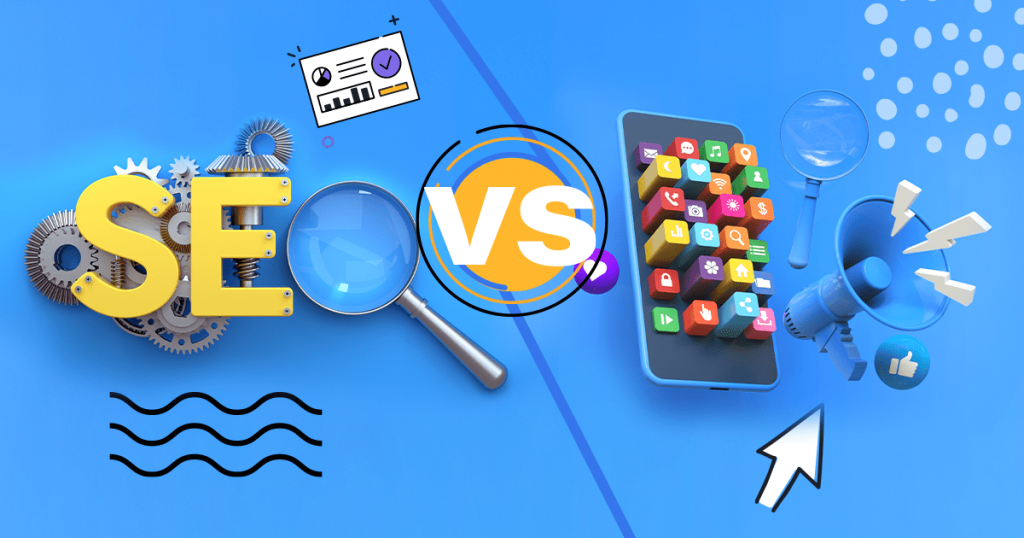You spend a lot of your time developing a marketing strategy, constantly analyzing what is working and what needs improvement.
You also have to keep up with the latest developments and technologies available in the marketing arena.
So, how do you know how much time to devote to different parts of your marketing strategy? For example, should you allocate more time to SEO or to your social marketing plan?
While you may want both, your time and budget are limited, so you may need to choose which one to devote more attention to at some point.
When it comes to strategic marketing, there’s no denying the role search engine optimization plays.
You also can’t deny that, due to today’s climate for socializing online, that social media marketing is key to your success as well.
Naturally, you want to achieve the highest ROI on your marketing efforts and also cater to a budget that may not allow overindulgence in both SEO and social media marketing.
But which one should you devote more attention to now and in the future? What’s the answer to the “SEO vs Social Media” dispute?
- SEO vs Social Media: What’s the Difference?
- The Benefits of an SEO Strategy
- The Advantages of a Social Media Plan
- SEO vs Social Media: Which Should Be the Focus of Your Business?
- The Bottom Line: You Need Both SEO and Social Media
- Wrap Up: Combine SEO with Social Media for Better Results
Download this post by entering your email below
SEO vs Social Media: What’s the Difference?
Both SEO and social media play important roles in your digital marketing strategy, each offering unique benefits.
They are also both inbound marketing tools helping to bring targeted audiences to your website.
Before deciding which will benefit your organization the most, it’s important to understand what each one is and isn’t to grasp how to go about optimizing your strategy.
➤ SEO is the powerhouse behind achieving high rankings on search engine results to queries.
The right SEO strategy increases your visibility and brings in higher numbers of organic leads.
➤ A social media strategic plan, on the other hand, involves itself specifically with social media platforms such as Facebook, Twitter, Instagram, and YouTube.
These platforms are used to promote the products or services you offer and serve as an increasingly vital tool to achieve your selling goals. They also serve as a place to create more brand awareness.
Two totally different tools, but equally powerful in their own way. Let’s take a look at their particular differences:
Difference #1: Underlying Purpose
SEO is about achieving higher ranking content on a search engine results page, providing your target audience with the information they need and want.
SEO strategy considers which keywords provide the most value, along with other tools such as formatting and link building.
Social media marketing is more about building online relationships and engaging with your buyer personas, creating brand awareness along the way.
In turn, you direct more traffic to your website due to an established social presence built via community building or by utilizing paid ads on the individual platforms.
Difference #2: How the Targeted Audience is Identified
Knowing who your targeted buyer personas are can successfully direct your SEO strategy as well as your social media marketing efforts.
Where these two marketing tools differ is in how they go about identifying the targeted audience.
During the planning strategies for your SEO strategy, you will be researching and identifying buyer personas who will be most interested in what you have to offer based on collected data.
From there, you cater your strategy to them specifically with search engine queries in mind.
When it comes to where to focus your attention in social media marketing, your research methods start with the platforms themselves.
By analyzing the demographics of each platform, you can identify who uses which platform more and who is interacting.
From there, you then focus your attention and budget on those. In other words, use social media to locate target audiences.
Difference #3: Type of Content
When it comes to content, SEO focuses on providing information based on research that answers some question or quest for knowledge by your targeted audience (your buyer personas).
The most popular is the use of long-form content on web pages, blogs, and articles.
With social media marketing, content serves another role. Its function is to elicit emotion and, in turn, entice engagement.
The type of content is usually short-form or visuals for social media.
These are two extremely unique uses of content and can serve you well if implemented correctly.
Difference #4: Measuring Results
To achieve successful SEO measurements, you’ll need patience.
Search engines require time to index content, and you’ll need to first establish yourself, gaining enough credibility to reach higher rankings on search results pages.
As a result, SEO requires continuous effort when it comes to measuring results.
The key performance indicators (KPIs) for SEO search focuses on traffic and also on click-through results.
On the flip side of that is social media marketing.
Social media is a fast-changing environment, and you can quickly see what is working and what is getting buried as newer content pops up.
You can also easily track KPIs here, such as levels of engagement (likes, comments, and shares), and also see instant feedback.
Difference #5: Number of Sites/Platforms
With SEO, you have fewer search engine sites to focus on, so you make more efficient use of your time and resources.
Opposite of that is social media marketing, which requires you to split your time among several different platforms, which can be time-consuming and costly.
There are more subtle differences between the two as well, but these are the ones that can make a difference in helping you determine how each fits best into your overall marketing strategy.
The Benefits of an SEO Strategy
Simply put, SEO is focused on optimizing your website for the search engines.
This optimization is important because search engines are more efficient in generating higher traffic to your website than all the social media sites combined.
There are definite benefits, then, to spending more of your time on developing an SEO strategy.
The perception of social media is often a way to connect with others and be entertained, not seek products or services.
Meanwhile, search engines are established vehicles for seeking them directly.
As a result, people further along in their buyer’s journey turn to search engines, and this leads to more conversions.
SEO strategy is a long-term investment, continuing to bring traffic to your website as queries are made, and your content is there to inform, educate, and entertain.
Additional benefits of an SEO strategy include:
- Targets more quality traffic.
- Improves visibility.
- Helps you establish authority and gain trust.
- Allows for reporting and analysis, and easier tracking of KPIs.
Search is, and will continue to be, the main driver of traffic to your website, so think long and hard before neglecting your SEO strategy.
The Advantages of a Social Media Plan
Social media has definitely risen above just being a platform for interactions among friends.
It now serves as a powerful mechanism for reaching your audience in new ways.
Having a social media plan will help you identify those ways and use them to attract more customers.
This plan is a type of blueprint where you identify what actions to take, what you’re posting schedule will be, and what your goals and objectives are.
It should also include ways to measure your KPIs.
Social media plans also include details on which platforms to use for best effect, how and when to use social media ads, and when and how often to boost posts.
It can also help you determine your tone of voice to use across all platforms, so you stay consistent and follow brand guidelines.
Benefits to having a social media plan include:
- Keeps you organized and on-track for more efficient social media marketing.
- Focuses on which goals are most important, such as building brand awareness, improving engagement, or driving conversions.
- Defines opportunities for interacting with target audiences.
- Boosts your brand by posting shareable content.
- Identifies ways to generate engagement.
- Allows for the strategy of letting others work for you, such as influencers, backlinks, and reviews.
- Identifies KPIs to track, such as engagement (comments, shares, likes).
SEO vs Social Media: Which Should Be the Focus of Your Business?
When it comes to determining whether you should be focusing your business on SEO or social media, there’s a lot to consider.
Both of these come with strengths and also weaknesses.
However, there are numerous ways SEO and social media marketing benefit each other.
➤ So, maybe the real question is, which one do you focus on the most, and how can it contribute to the other?
More often than not these days, going for a combined effort is the best bet.
Your website will benefit from a mixture of social media marketing and SEO marketing rather than relying on just one or the other.
Here are a few ways they work together:
Boosting traffic
SEO will ensure your content is readable by search engines while social media gets your content out in front of your targeted audience faster.
Improving strategies
Social media provides a way to locate your audience to target with your SEO.
Boosting visibility
The two work together with content by linking one of your SEO-optimized blog posts to a graphic shared on social media, making content easier to find for social media participants.
Controlling the budget
You can save time and resources when your planning includes both SEO and social media together.
The Bottom Line: You Need Both SEO and Social Media
No one wins in the “SEO vs Social Media” dispute. Each one benefits the other.
Of course, returns achieved through social media may be smaller than with SEO, but it helps expand your reach.
If you postpone or reject going the social media route, keep in mind that those on social media may wonder why you’re not there and can lead to thoughts that you’re not with the times, and you don’t care about the things they do.
So, there’s no escape:
➤ SEO can bring visitors to your website where those visitors can continue the connection on your social media platforms.
➤ Social media engagement can lead to more webpage traffic, which will lead to a boost in search engine rankings.
Social media is a hyper-strategy, jumping around and constantly on the pulse of your audience, while SEO is a steady progression to achieving the results you want.
Slow and steady may win the race, but knowing what’s happening now can get you there faster.
Wrap Up: Combine SEO with Social Media for Better Results
Combining SEO strategy and a social media plan may just be the powerhouse marketing strategy you need.
Need help diagnosing your current SEO strategy for your business?
Then complete our SEO maturity assessment!

![[WA] Ultimate Content Marketing Kit](https://rockcontent.com/wp-content/uploads/2022/08/Content-Marketing-Kit-750x200px.jpg)










